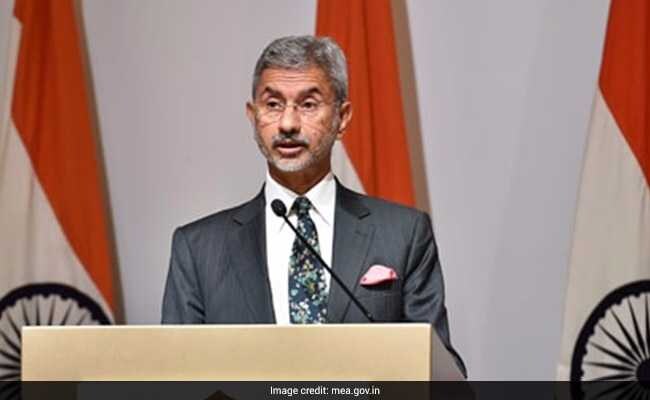
According to S Jaishankar, the US foreign policy matters to India as much as it does to ASEAN nations
Singapore:
The US is "redrawing" its policy of engagement with others but not withdrawing from the world, and this change matters to India and Southeast Asia, Foreign Secretary S Jaishankar said today.
His comments came as several countries around the world fear the US, under President Donald Trump's "transactional" policy, may not be willing to engage with regional issues in the absence of a meaningful return in American interests.
The remarks assume significance in terms of India's 'Act East' policy as China becomes more assertive in the ASEAN region, which is made up of Brunei, Cambodia, Indonesia, Laos, Malaysia, Myanmar, the Philippines, Singapore, Thailand and Vietnam.
Speaking on 'India, ASEAN and the Changing Geopolitics' at the Lee Kuan Yew School of Public Policy in Singapore, Mr Jaishankar said the "big question" before the world today is the global strategic approach of the US.
"This matters to India as much as it does to ASEAN nations, and indeed to the entire world. There seem to be a number of parallel processes at work," he said at the lecture marking 25 years of India-ASEAN relations.
"The United States is, generally speaking, reframing its terms of engagement with the world. In some arenas, there may be a redefinition of its objectives," Jaishankar said.
"In others, we may be looking at a redrawing of its posture. At the same time, let us be clear what is not happening: the US is not withdrawing from the world," he said. On the contrary, he said, the US was seeking to get what it hopes to be a better deal from the rest of the world.
The US, since Trump assumed office in January, has changed its policies on several issues, most importantly on climate change by withdrawing from the historic Paris accord.
The new administration has shown keenness for bilateral deals over multilateral agreements like the Trans-Pacific Partnership trade deal.
Twelve countries, that included ASEAN members Malaysia, Vietnam, Brunei, Singapore, signed up to the TPP in February 2016, representing roughly 40 per cent of the world's economic output.
Mr Jaishakar, who was the Ambassador of India to China from 2009-2013, and then to the US before becoming the foreign secretary in January 2015, said, "These are still early days.It is important not to jump to conclusions."
The continued presence of the US in the Asia-Pacific is an important factor in the calculations of all nations.
Developing a nuanced understanding of the unfolding situation is a must for policymakers, as well as analysts, he said.
His comments came as several countries around the world fear the US, under President Donald Trump's "transactional" policy, may not be willing to engage with regional issues in the absence of a meaningful return in American interests.
The remarks assume significance in terms of India's 'Act East' policy as China becomes more assertive in the ASEAN region, which is made up of Brunei, Cambodia, Indonesia, Laos, Malaysia, Myanmar, the Philippines, Singapore, Thailand and Vietnam.
Speaking on 'India, ASEAN and the Changing Geopolitics' at the Lee Kuan Yew School of Public Policy in Singapore, Mr Jaishankar said the "big question" before the world today is the global strategic approach of the US.
"This matters to India as much as it does to ASEAN nations, and indeed to the entire world. There seem to be a number of parallel processes at work," he said at the lecture marking 25 years of India-ASEAN relations.
"The United States is, generally speaking, reframing its terms of engagement with the world. In some arenas, there may be a redefinition of its objectives," Jaishankar said.
"In others, we may be looking at a redrawing of its posture. At the same time, let us be clear what is not happening: the US is not withdrawing from the world," he said. On the contrary, he said, the US was seeking to get what it hopes to be a better deal from the rest of the world.
The US, since Trump assumed office in January, has changed its policies on several issues, most importantly on climate change by withdrawing from the historic Paris accord.
The new administration has shown keenness for bilateral deals over multilateral agreements like the Trans-Pacific Partnership trade deal.
Twelve countries, that included ASEAN members Malaysia, Vietnam, Brunei, Singapore, signed up to the TPP in February 2016, representing roughly 40 per cent of the world's economic output.
Mr Jaishakar, who was the Ambassador of India to China from 2009-2013, and then to the US before becoming the foreign secretary in January 2015, said, "These are still early days.It is important not to jump to conclusions."
The continued presence of the US in the Asia-Pacific is an important factor in the calculations of all nations.
Developing a nuanced understanding of the unfolding situation is a must for policymakers, as well as analysts, he said.
Track Latest News Live on NDTV.com and get news updates from India and around the world

